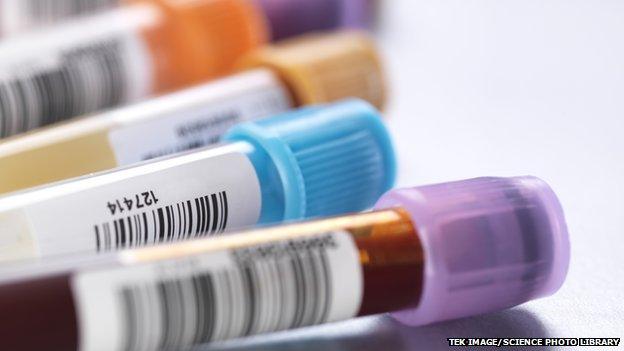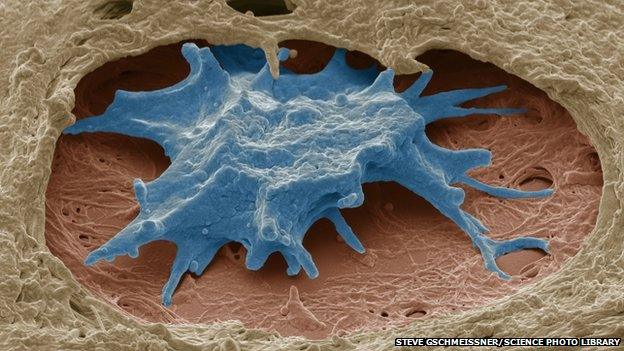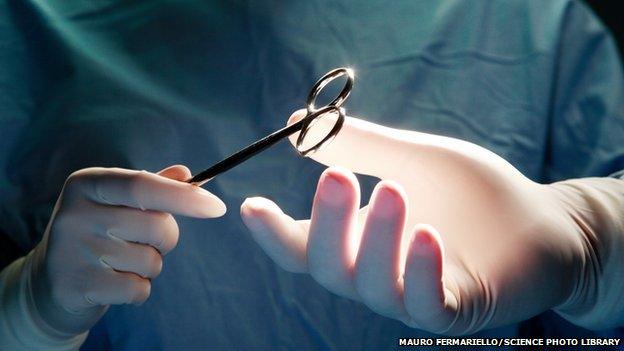Preventive surgery for cancer genes
- Published

While most women in the UK have a one in 54 chance of developing ovarian cancer in their lifetime, for those who inherit faulty genes, like Angelina Jolie, the risk increases to one in two.
If women know they have BRCA gene mutations, they can choose to take action before cancer develops.
But weighing the risk of cancer that might never grow against the very real trauma of surgery to remove healthy tissue as a preventive measure is an incredibly difficult conundrum, as Angelina Jolie explains.
"I did not do this solely because I carry the BRCA1 gene mutation, and I want other women to hear this.
"A positive BRCA test does not mean a leap to surgery," she says in her diary in the New York Times.
"In my case, the Eastern and Western doctors I met agreed that surgery to remove my tubes and ovaries was the best option, because on top of the BRCA gene, three women in my family have died from cancer."

What is BRCA?

BRCA1 and BRCA2 are genes that help repair damage to the DNA in our cells. If people inherit a mutated version of either of these genes it puts them at greater risk of certain cancers.
Jolie learned some time ago that she had inherited a faulty BRCA1 gene from her mother.
She had already lost her mother, grandmother and aunt to cancer, which alerted doctors that she might also be at risk.

Who should get tested?

In the UK, around one in every 500 people will carry a BRCA mutation.
Generally, experts only recommend screening if a person has a strong family history of breast or ovarian cancer.
For example:
One first degree relative (mum, dad, sibling) and one second degree relative (aunt, uncle, grandparent) diagnosed before the age of 50
Two first degree relatives diagnosed before the age of 50
Three or more first or second degree relatives diagnosed at any age


If I have BRCA, what are my risks?
For women carriers of BRCA1, it means their lifetime risk of breast cancer will range from 65-85% and their risk of ovarian cancer from 40-50%.
Men with BRCA mutations also have a slightly elevated risk of breast cancer.
Jolie's doctors estimated that she had an 87% risk of breast cancer and a 50% risk of ovarian cancer in her lifetime unless she underwent surgery.
In 2013, award-winning actress decided to have both breasts removed. And now in 2015 she has had her next preventive surgery - the removal of her ovaries and fallopian tubes.
Her doctors advised that she should have this surgery about a decade before the earliest onset of cancer in her female relatives. Her mother's ovarian cancer was diagnosed when she was 49. Jolie is now 39.

Does surgery remove any risk of cancer?

No, but it does greatly reduce the risk.
Surgery does not completely guarantee that cancer will not develop - it is impossible to remove all of the at-risk tissue.
And there are side effects to consider - taking out the ovaries removes a woman's fertility and puts her into the menopause, for example.
Faulty BRCA genes are responsible for around 5% of all breast cancer cases and 10% of ovarian cancers, meaning the rest are caused by other factors.

What if I don't want surgery?

Although Jolie says surgery was the right choice for her, she says it may not be for others faced with the same dilemma.
"There is more than one way to deal with any health issue. The most important thing is to learn about the options and choose what is right for you personally."
Some people may opt instead for enhanced screening - frequent check-ups to make sure no cancer is growing.
Doctors may also prescribe drugs like tamoxifen to reduce the risk of cancer developing.
As Jolie says: "There is more than one way to deal with any health issue. The most important thing is to learn about the options and choose what is right for you personally."
- Published24 March 2015
